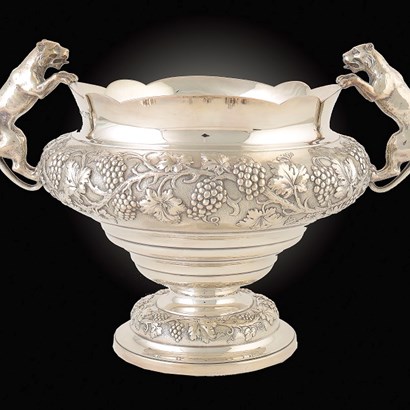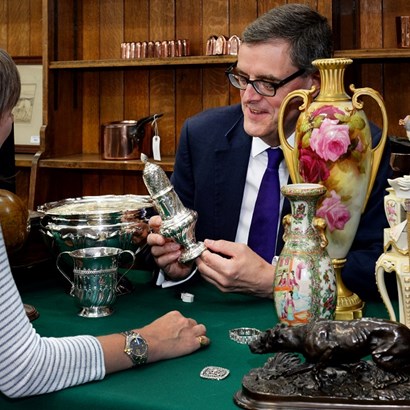Auction Insights
Nottingham Luddite Sword
Two hundred years to the day since he was caught a notorious Nottingham Luddite’s fearsome sword returns to the scene of the crime.
The Luddites, otherwise known as frame breakers, were marauding gangs of up to 50 heavily armed, lawless men bent on acts of violence and destruction, active from 1811-16. Whilst that is certainly true, what would now be called terrorism and with it the near certainty of a death sentence if apprehended, stemmed from more than a fear of mechanisation displacing skilled labour. But that was the cause that sparked the trouble which shook the established order of Nottingham and the north of England in those tumultuous years of the early 19th century – the age of Byron, Jane Austen and revolutions, both political and industrial.
The very crudeness of John Blackburn’s sabre (to give it its correct name) is shocking but that is why, other than in museums and especially Nottingham’s Galleries of Justice, it is rare that a relic to be so thought provoking because it so resonates with events that shaped history.
Blackburn was one of the ring leaders of a gang of Nottingham men who carried out one of the most infamous of Luddite attacks when they went to Loughborough on the night of 28th June 1816, no doubt well-fortified on the way (for they were said to be “noisy and boisterous”) and wrecked John Heathcote’s factory there, shooting one of his men in the course of the attack. Three of the gang were arrested and one, James Towle was hanged.
The significance of this sabre lies in what happened next. On Friday, January 3rd 1817 John Blackburn was caught poaching, no doubt in the dead of night when he raided the home of William Cook at Shortwood, Cossall. Cook was Lord Middleton’s gamekeeper and fought back, overpowered Blackburn and arrested him. Now facing the same fate as Towle, the 23 year old Blackburn turned King’s evidence. As a direct result, six of his comrades who went on the Loughborough raid were hanged after being convicted at Leicester assizes. The Nottingham six were Mitchell, Crowder, Amos, Savage, Withers and Rodney Towle, the brother of William. Even by early 19th century standards the 15,000 crowd that turned up to watch the macabre spectacle was staggering but such was the Luddite’s notoriety. Blackburn and his young family were sent to Canada for their own safety.
The sabre resembles that which might have been used by a customs man or parish constable (for there was no police force at that time, the authorities relying on the militia). The heavy, 58cm steel blade has a now smooth wooden hilt, its original leather or other grip long gone. Cook or possibly Lord Middleton himself had the brass pommel of the sword engraved as a trophy “TAKEN FROM BLACKBORNE GENL OF THE LUDDITES BY W COOK SHORTWOOD JANY 3RD 1817”. It would not be surprising if the mis-spelling of Blackburn’s name was deliberate, intended to demonise him, for example in the same way as the evil pirate Blackbeard, which sounds much worse than ‘Edward’.
It is interesting to see Blackburn described as the ‘General’ as it is early evidence of the traditional view that the Luddites regarded themselves as being more than a match for the local militia, or anyone else for that matter.
Food was especially scarce in 1816, the ‘year without a summer’ because of the severe climate disruption that is now known to have been caused by the eruption of Mount Tombora. Poverty and starvation were almost endemic amongst the working class and poor people at a time when the region was already suffering greatly from unemployment at the economic slump which followed the Battle of Waterloo. Many men turned to poaching to feed their family.
Lancelot Rolleston, The Watnall magistrate that ‘turned’ Blackburn, triumphantly reported to the Duke of Newcastle that the confession would result in “entirely suppressing that system of outrage, which has hitherto defied the utmost vigilance of the Magistracy.”
James Towle in a statement shortly before he was hanged thought Blackburn or his brother had shot Heathcote’s employee and some of the men were heard grumbling as they tramped back to Nottingham that they’d “have nobody to blame but Blackburn if any of them got hanged…” Subsequent events were to show they were correct.
Mystery surrounds the figure of ‘Ned Ludd’, the so called General or King of the Luddites, as well it might, because there was no such person. One Ned Ludlam an 18th century Leicester stockinger may have inspired the folklore but whether he existed or not Luddites were often known as the Old Neds of Ned Luds. It is impossible to imagine that a considerable number of Nottingham citizens did not know the men’s names but whether from fear or sympathy with their plight did not report them.
Many items pass through The Auction House that count as historical or are even historic, but this one definitely features in my list for a ‘History of Nottingham in 100 objects’. The weapon will be sold at The Auction House in March and is estimated in excess of £500.
< Back to Auction Insights



